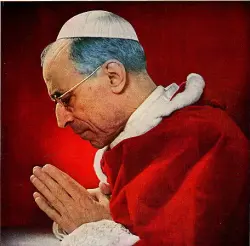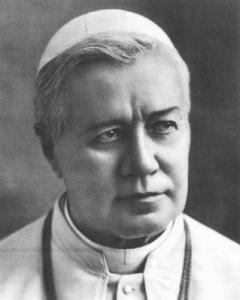Patience, Penance, and Prayer
We have had in the last days another demonstration of how far things can decay within the Church, and how fast. A Pope openly flirting with formal heresy, and to all intents and purposes stating he does not care if he falls into it – because he knows better, you know, what with being so humble and wearing black shoes…. – is something most of us – and certainly yours truly – had not expected to happen.
Things can go south very fast now, and there is no saying when the next bomb will explode and how big the conflagration will be.
Nowadays, in the modern age of worldwide information networks, we are all accustomed to a world of fast actions and reactions. But this is not how the Church works; both because the ways of her inner workings are still radically different and because – I think – God demands from us that we exercise ourselves in patience, prayer, hope, and submission when the chips are down.
Look back to Pope John XXII, for example. The scandal around his thesis went on for a long time, a couple of years rather than weeks or months. Those who were informed of the matter certainly did not lose hope, and did not abandon their faith, because they had to get up every morning knowing that the Pope was somewhere between a satanical, heretical bastard and a stupid, arrogant child in search of a world stage. They did not decide that it was for them to judge if the Pope is Pope. They did not lose faith because of the obvious obscenity of the heretical show unfolding under they very eyes. They probably did not even expect what in the end proved a rapid solution of a crisis that could have gone on for very long.
Or think about the Arian Crisis. Faithful Catholics had to wait decades to see orthodoxy vindicated. Surely, countless people died during this crisis, never knowing how long it would take after their death before the mess ended; but they died in faith, knowing that in the end Christ would triumph.
The Western Schism was almost as brutal. Imagine a situation in which two people – for a short period of time, three – make a claim to the Papacy; and they are not the usual lunatics, but people attracted to their cause substantial chunks of the clergy, and splitting into two many of the major religious orders. The Western Schism also went on for around four decades.
We must reflect that what is required of us first is faith and humility, and a humble submission to whatever challenge God in His justice decides to throw at us. Difficult as it is to do so, it is our duty nevertheless.
We are now possibly on the brink of such a tragedy. We could witness a situation in which a Pope proclaims a formal heresy, and there is no strength among the Cardinals to challenge him. We might live a situation in which the heretical behaviour of a Pope is condemned – as happened in the case of Honorius, or Formosus – only after his death. This means that – as happened in the other cases – the heretical behaviour went on without being officially challenged during the relevant papacy. This could have been more understandable in the case of Honorius – whose heretical thinking might have been more concealed and difficult to detect -, but it is difficult to think that Formosus’ many alleged failings went unchallenged for any other reason than convenience. Very possibly, the scandal of an unchallenged Pope is what moved Stephen VI to the bizarre, utterly macabre “cadaver synod” (note here: a synod is called to sit in judgment over a Pope), but be it as it may, there can be no doubt no scandal had been grave enough.
What did the faithful do during all those troubled times? They kept the faith. They prayed for the return of better times. They accepted with patience and Christian resignation the challenges sent to them, knowing that the just God who sends the punishment will also send its end when the time is ripe. They did not think they had the right to decide who is the Pope. They did not think they were authorised to believe the most childish, outlandish, outright retarded stories about popes who are elected and then bullied into ignoring their election. They did not think they had the right to decide that there is no Pope at all, until it pleases them to change their mind; after which event there will, of course, be a legitimate Pope again.
We might soon live another of the troubled times mentioned above. If such a tragedy were to happen, it would be not only a punishment for the quasi-apostasy of many fake faithful, but also a test of faithfulness, obedience and patience for those who still keep the faith of our fathers.
Patience, penance and prayer are, I think, the key. We might have need for it fairly soon, so let us start to train ourselves now. Let us make so, that the work of the devil, allowed by God for our punishment, may be a way for us to merit more, perhaps even to escape hell. Let us turn the devil’s work upside down and, by God’s grace, turn Satan’s rubbish into spiritual gold. As God sends us troubles, He also sends us the way, if we collaborate with him in obedience, to overcome it and gain from it a spiritual advantage.
Alessandro Manzoni’s words should be our guide: Dio non turba mai la gioia de’ suoi figli, se non per prepararne loro una più certa e più grande: God never troubles the joy of his children, unless it be to prepare for them a more certain and greater one.
Patience, Penance, and Prayer.
This is how you react to an evil Pope.
M
Posted on June 3, 2015, in Catholicism, Conservative Catholicism, Traditional Catholicism and tagged 2015 Synod, Heresy, Pope Francis. Bookmark the permalink. 11 Comments.





















Mundabor,
there are many bloggers who write good articles from time to time, but there are only a handful who are able to write their absolute best almost every month. How is that possible? The quality of their work just keeps improving, and what was great last month is even better now. You are certainly among that select handful of truly great Catholic bloggers.
Your blog is a light amidst a sea of growing darkness.
Many thanks, Sir!
M
Thanks, M. You always help me get my bearings as we navigate this sea of confusion.
Very beautiful. Thank you.
Here is a new book explaining the constant teachings of the Church that may be ‘discussed’
at the Synod on the Family in October, 2015:
Thank you for those wise words
Words of hope indeed.
Barbara
Thank you! This is how many persevered during the troubling pontificates of Paul VI and JPII, and yes, even Benedict XVI. The Church has been in turmoil for years—I think most, if not all, of my life. It does not mean the Church does not exist. In the fullness of time God will end this horrendous trial, and I hope and pray that I (and all Catholics of good will) will keep the Faith in patient perseverance until then. One must plan to be ‘in it for the long haul’, not ready to give up the Faith to join forces with each new dissident. Although my parents died in the 90s, during the JPII era, they each received Last Rights and were buried in real Requiem Masses, not expecting a reward this side of heaven. I pray I will persevere as they did so that I may die as they did.
Amen! Well said.
The pontificate of Benedict the XVI was not troubling. No Pope is perfect and the Barque of Peter was righting herself under Benedict. I suspect that after the spiritual winter of JP II the Church attracted many new foot soldiers under Benedict. I read over and over of how thinking people who had abandoned the Church came home with the ascendancy of Benedict.
I believe it petty and mean-spirited to disparage the holy, learned and genuinely humble Benedict. There was a lilt in my step during the 8 year Benedictine papacy. He remains a lion for the faith. If I get to heaven he’s the first soul I want to hug when I get there.
I do not think it serves the Church to ignore the many failings of Benedict.
A kind and gentle pastor, he failed gravely in not providing the Church with the men she so desperately needed.
His appointments were, generally speaking, a disaster. He was so led by the nose, that he probably resigned without the faintest idea of what his cardinals (half of them his appointment) might be doing.j
He saw the mounting wave of dissent, and did not do anything practical to stop it.
We are eternally indebted to him for SP. But even that, he never had the guts to enforce.
M